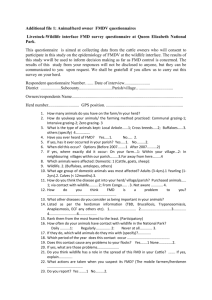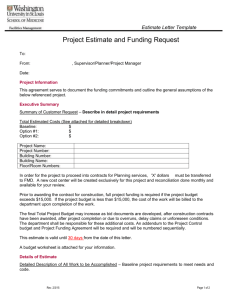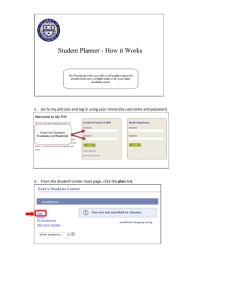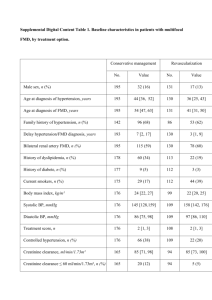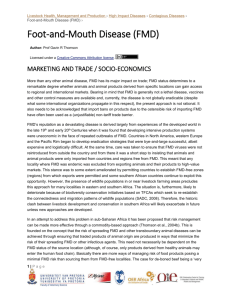PD Presentation – Steps 1 & 2 - Facilities Management Department
advertisement
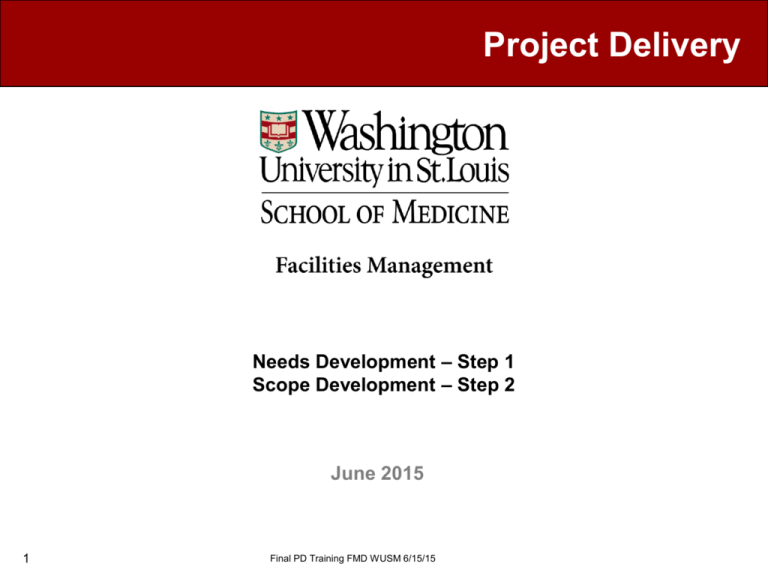
Project Delivery Needs Development – Step 1 Scope Development – Step 2 June 2015 1 Final PD Training FMD WUSM 6/15/15 Planner/Project Management Concept Step 1: Needs Development Step 2: Scope Development Step 3: Selection of Design Team Step 4: Design Phase Step 5: Selection of Contractor Step 6: Construction Phase Step 7: Transition, Activation and Closeout Wrap-Up Summary 2 Q&A Final PD Training FMD WUSM 6/15/15 Step 1: Needs Development Project Request Received Project request vetted for assignment Project request assigned The “Needs Development” step in the project delivery process refers to when a project is initiated and assigned to a Planner/Project Manager (PM) in the Facilities Management Department (FMD). A Project is Defined as something that has a finite start and finish. Remember a project is “Not” always construction! 3 Final PD Training FMD WUSM 6/15/15 Step 1: Needs Development All Facilities Management Department projects can begin in one of the following ways: 1. Planning and Project Request Form on FMD Website 2. Online Work Request (ServiceNow) on FMD Website 3. Customer Requests Via Phone or Email to Facilities Integrated Service Center 4. Capital Renewal Request 5. Emergencies 6. Capital Planning Process The “Needs Development” step in the project delivery process refers to when a project is assigned to a Planner/Project Manager in FMD. 4 Final PD Training FMD WUSM 6/15/15 Step 1: Needs Development Planning and Project Request Form The Planning and Project Request Form is an online intake form available to customers. This form should be filled out and authorized by the business manager of the department prior to the assignment of a planner or Planner/PM. An automated response acknowledging receipt is delivered immediately and within 48 hours, a Planner/PM will contact the requestor to validate the request and discuss the next steps. These intake forms are reviewed weekly by the Director of Capital Projects and the Senior Planner III for assignment. Online Work Request (ServiceNow) or Customer Requests Via Phone or Email to Facilities Integrated Service Center • • • 5 The online work request form is used to request several different services provided by FMD including: renovation, serviceable and billable work. The online form is completed by the requestor and it workflows via e-mail for appropriate department approvals. Once all department approvals have been received, FMD is notified that the request is ready for processing. After an initial review and analysis by FMD, the request is forwarded to the applicable service area for assignment and project completion. Work requests can also be called into the Facilities Integrated Service Center where the customer may be assisted with filling out the form by a customer service representative. An automated response acknowledging receipt is delivered immediately via e-mail and once a technician/employee is assigned to complete the work, a second message is delivered via e-mail. For planning/project related work requests, the Planner/PM is always responsible for following up to ensure work completion. Final PD Training FMD WUSM 6/15/15 Step 1: Needs Development Capital Renewal Request There is a five year rolling Capital Renewal Plan, frequently called the Facilities Infrastructure Renewal and Maintenance Plan or FIRM, this plan is managed by the Senior Director of Facilities Operations, which is reviewed annually. All requests received within the calendar year will be reviewed and prioritized, based on life safety, business impact/continuity and energy management. Within 48 hours, the Senior Director of Facilities Operations will contact the requestor to validate the request and discuss the next steps. Projects can be initiated through the Planning and Project Request Form. Typical Projects: Building and campus infrastructure, energy projects and MEP systems renewal projects. 6 Final PD Training FMD WUSM 6/15/15 Step 1: Needs Development Emergencies • Requests identified as emergencies (see the Facilities Emergency Response Guidelines - FERG) will be escalated and approved by the Senior Director of Facilities Operations or Assistant Vice Chancellor/Assistant Dean of Facilities and managed according to importance of impact. • Wherever possible, the Planner/PM will follow the applicable project delivery process, including University policies. • The University is currently soliciting for an emergency response and restoration vendor, once in place project managers will be required to both utilize and follow all policies and practices applicable to this contract and emergency management protocol outlined. 7 Final PD Training FMD WUSM 6/15/15 Step 1: Needs Development Capital Planning Process • There is a monthly Pre-Agenda Meeting that the Planner/PM utilizes to submit projects requests for review and vetting. These requests should be submitted to the Director of Capital Projects or the Senior Director of Facilities Operations for review and authorization to proceed and to determine funding options, scope validation and schedule. • At the monthly Executive Capital Meeting, all requests over $15,000 are review and sent on for additional approvals, if needed, based on the funding amount. This committee is made up of the Assistant Vice Chancellor/Assistant Dean of Finance, the Associate Vice Chancellor/Associate Dean of Administration and Finance, the Assistant Vice Chancellor/Assistant Dean of Facilities, the Assistant Vice Chancellor/Assistant Dean of MSCITS the Senior Director of Facilities Operations, Director of Capital Projects, Director of Capital Planning, Senior Planner III, the Fiscal Administrator, and the Director of Business Operations. • This group will review any request over $15,000. Additional approvals may be required based on the funding amount (see the Project & Sole Source Approval levels). 8 Final PD Training FMD WUSM 6/15/15 Step 1: Needs Development Project request acknowledgement • System generated auto acknowledgement • Acknowledgement email by Sr. Director for FERG and Capital renewal request projects • Approval at the monthly executive capital meeting for projects submitted through capital planning process 9 Final PD Training FMD WUSM 6/15/15 Step 1: Needs Development Project service request number • Requested to and assigned by CPMS Project manager/planner assignment • Weekly review meeting by Senior Planner III and director of Capital projects to monitor workload and assign out new requests to planning or capital projects team. • If operations project they will coordinate assignment with Facilities Operations Senior Director 10 Final PD Training FMD WUSM 6/15/15 Step 1: Needs Development Questions / Discussion 11 Final PD Training FMD WUSM 6/15/15 Step 2: Scope Development Planner/PM initiates contact with the customer and develops initial project scope Initial project scope is documented by Planner/PM and validated by Customer Complete POR document which includes all project components Confirm initial funding & Establish Funding Source Program/ Bid Development using bid request form Prepare for next phase The focus of this step is to meet the customer, prepare the initial project scope, estimate, and schedule. This phase includes developing the project definition and vision, establishing the Project Team, defining project objectives and requirements, and project setup in FMD. At the end of this step, the project will have received all customer approvals and funding authorizations. 12 Final PD Training FMD WUSM 6/15/15 Step 2: Scope Development • • • • 13 Customer Contact The Planner/PM or assigned service area will make follow up contact with the customer, to begin the process of defining the project utilizing the Project Submittal Information Form with the appropriate level of detail so subsequent activities can be completed. The Planner/PM should request a list of stakeholders from the client to gain an early understanding of the project’s key personnel. For research projects, validate any start-up components that have been discussed with the Associate Vice Chancellor of Research. Start-up components will need to be validated and attached as an addendum to the Program of Requirements (POR). Once the project scope is better defined, a POR will be completed and endorsed by the customer. Final PD Training FMD WUSM 6/15/15 Step 2: Scope Development • • • • 14 Project Endorsement from Customer After confirming the project scope with the customer, the Planner/PM needs to review and identify MEPFP scope additions by reviewing the Facilities Operation’s Building Condition Assessment plan and collaborating with the Senior Director of Facilities Operations. After the total scope is confirmed, the Planner/PM is equipped to begin the project estimate. A detailed project budget using the Preliminary Estimate Form (PEF) is prepared and reviewed internally with Senior FMD stakeholders. The budget will be presented to the customer once approved internally. At this time, a discussion and determination of the funding source will be required. A Preliminary Estimate Form (PEF) is available to assist with budget development. The initial budgets are refined throughout the planning and design phases and until the project is presented for bidding. It is imperative that all elements of the budget are clearly defined, captured, and developed throughout each phase. Final PD Training FMD WUSM 6/15/15 Step 2: Scope Development Project Endorsement from Customer cont. • The PEF is the first step in establishing the total cost of the project and is provided along with a preliminary project schedule based on the customer’s critical delivery date. • A preliminary project schedule that meets the customers’ needs should be prepared and should identify key milestones. When preparing the schedule, attention must be paid to approval meeting dates (current fiscal year project and Project & Sole Source Approval levels and meeting dates), review time, desired delivery date, and construction periods. A conceptual project schedule tool that includes most major project steps and milestones of a project is available to Planner/PMs. • The example project schedule tool includes high level project milestones and can serve as a reminder of most of the time constraints placed on a project. It is useful for planning a realistic schedule based on known steps and the desired completion date. 15 Final PD Training FMD WUSM 6/15/15 Step 2: Scope Development Project Endorsement from Customer cont. • For all projects, excluding Capital Renewal Requests, the Planner/PM will present a validated/revised PEF and schedule for endorsement by the customer. • For Capital Renewal requests, the Project Manager will present a PEF and schedule for endorsement by the Senior Director of Facilities Operations. 16 Final PD Training FMD WUSM 6/15/15 Step 2: Scope Development Confirm Funding • • • • • • 17 If the POR is approved by the customer, it is returned to the Planner/PM to complete the Project Submittal Information Form . The Planner/PM submits the POR to the Director of Capital Projects and FMD Business Operations for the formal approval request. At this stage, the Fiscal Administrator (FA) will create a resolution (long or short form) for approval. At this stage, in most cases, initial funding is for project planning expenses only. Final funding is sought when total project scope and estimated costs are known. After final approval, Property Accounting will then create a journal entry to transfer actual funding from the approved sources into the project fund. After the project is fully funded, the FA will email the relevant stakeholders, including the Planner/PM and Facilities Services Center (FISC). Business Operations will set-up the project details in the construction accounting system and create a work request number for the project in ServiceNow to facilitate internal chargeable work on the project. Final PD Training FMD WUSM 6/15/15 Step 2: Scope Development Programming/Scope Development 18 • While not all projects have full programs, all projects should have a Program of Requirements (POR) or a limited scope document. All projects will require a charter (POR, short form or long form). • The goal of programming is to further define the project’s relationship with the University as a whole, the mission and vision of the project, the objectives of the project, and to provide detailed information of all identifiable spaces to be constructed or renovated – including existing infrastructure improvement issues and exterior features. This information is presented in the POR. • An important first step is determining whether the program should be prepared by in house staff or by a consultant. Projects of significant size and complexity should have the program prepared by either the A/E or a programming consultant. If the services of an A/E or consultant are required, the Planner/PM should proceed to Design Team/Professional Services Selection Process. Final PD Training FMD WUSM 6/15/15 Step 2: Scope Development Programming/Scope Development cont. • The programming process begins with an initial customer meeting and the process continues until the program is approved by the customer. • Once the program is approved by the customer, it is forwarded to either the Director of Capital Projects, Senior Planner III and/or Senior Director of Facilities Operations for the next step in the approval process. • If required, the program will be reviewed by the Assistant Vice Chancellor/Assistant Dean of Facilities and/or University leadership, as applicable. 19 Final PD Training FMD WUSM 6/15/15 Step 2: Scope Development Prepare for Next Phase • 20 Before moving on to the next phase, the Planner/PM will communicate with the customer that the project is proceeding and that the amount and funding for a planning fund are needed from the customer. Final PD Training FMD WUSM 6/15/15 Step 2: Scope Development Records Management Project records, whether electronic or hardcopy, are important records of the work performed by FMD. Project documents must be organized for quick and easy access. It is critical that these records are complete, thorough, documented, and retrievable. A standardized Records Management Process has been developed to assist in filing both hard and electronic project documents. Project records are the responsibility of the assigned Planner/PM. A record is any document, device, or item, regardless of physical form or characteristic, created or received, that serves to provide evidence of the organization, functions, policies, decisions, procedures, operations, or other activities of the project. Some examples of project records are the contracts, change orders, meeting minutes, e-mails with directives, payment request, invoices, etc. 21 Final PD Training FMD WUSM 6/15/15 Step 2: Scope Development Records Management cont. A non-record is any document, device, or item, regardless of physical form or characteristic, created or received, that DOES NOT serve to document the organization, functions, policies, decisions, procedures, operations, or other activities of the project. Some examples of non-records are preliminary drafts (when superseded), simple transactional communications, “personal copy,” “extra copy,” etc. Please refer to the email etiquette guidelines to ensure you understand the proper way to respond to correspondence as well as the rules related to public information. All records created will be complete, objective, and reflective of concerns for safety, ethics, and compliance with university policy, proper business practices, and the law. Ambiguous language, exaggerations, subjective comments, and other remarks that can be misinterpreted should be avoided. Creating personal template tools or forms is not allowed without written authorization from FMD Senior Leadership. 22 Final PD Training FMD WUSM 6/15/15 Step 2: Scope Development Records Management cont. Each Planner/PM should be proficient with the file structure and their responsibilities as they relate to hardcopy and electronic file management of the project. Using the standard project file structure will: • • • Maintain consistency across projects Reduce workload by offering a readymade and standardized template Ease the alignment of electronic file and hardcopy file structure It is important that all Planner/PMs and Business Operations are familiar with FMD’s Records Management Process and the standard filing structure, to ensure consistency in the management of project files. The guidelines address both hard copy and electronic files. Random sampling of project files will occur by the Director of Capital Projects, Project and Records Coordinator or Business Operations Representative to ensure file and records management compliance. Maintaining accurate files will be part of each Planner/PMs annual performance evaluation. 23 Final PD Training FMD WUSM 6/15/15 Step 2: Scope Development Questions / Discussion 24 Final PD Training FMD WUSM 6/15/15
